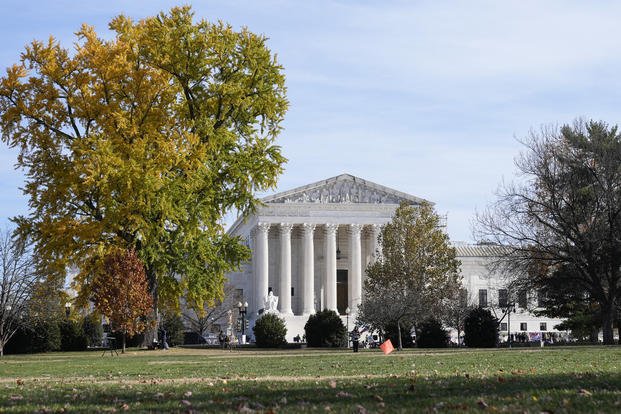

The U.S. Supreme Court will consider a case Monday from medically retired service members who say the Defense Department’s misinterpretation of a law prevented them from receiving the maximum amount of disability compensation for their combat-related injuries.
The class-action suit, representing roughly 9,000 service members, challenges a rule that requires veterans to file compensation claims within six years of receiving a VA disability ratings decision, saying the Defense Department has wrongfully applied it to combat-related special compensation.
The DoD says the time limit applies to decisions to award retroactive disability pay for combat injuries to medical retirees, but attorneys for the lead plaintiff, retired Cpl. Simon Soto, say the law isn’t relevant to those claims.
Read Next: Army Suspends Fort McCoy’s First Female Commander Amid Trump Portrait Display Controversy
“Whether thousands of combat veterans now and into the future lose all or part of the special compensation they earned through service to and sacrifice for our nation is an exceptionally important question that merits this court’s review,” wrote Soto’s attorneys in their petition to the Supreme Court filed last September.
Soto, a retired Marine Corps mortuary affairs specialist, argued that he should have received several more years of retroactive combat-related special compensation, or CRSC, but did not because the Navy limited it to six years, citing what is known as the Barring Act that limits claims to those filed within six years after they accrue.
Soto enlisted in the Marine Corps in August 2000 and served two tours in Iraq in mortuary affairs, searching, recovering and caring for the remains of service members and others killed in combat. He developed post-traumatic stress disorder as a result of his job and medically retired in 2006.
In 2009, the Department of Veterans Affairs awarded Soto disability compensation for his service-connected mental health condition, and in 2016 he applied for combat-related special compensation — pay that is awarded to some service members who retire as a result of a service-connected medical condition.
When the Navy awarded Soto CRSC, it backdated the pay to July 2010 based on the interpretation of the law.
The Barring Act requires veterans to file compensation claims within six years of receiving a VA disability ratings decision. After the six-year limit expires, veterans qualify only for up to six years’ worth of payments that are due to them.
Attorneys for the government say Congress established the six-year deadline for the submission of claims and argue that combat-related special compensation falls under it.
In addition, they wrote in court documents, “Agencies are not permitted to waive or extend this six-year statute of limitations except where a statute expressly authorizes.”
But Soto’s attorneys say the law does not apply in this case and specifically addresses VA disability compensation. Combat-related special compensation is provided by the Defense Department to replace, in part, any military retirement pay that may be withheld due to receipt of VA compensation.
The attorneys argue that Soto should have received back payments to January 2008 when Congress extended the combat compensation to medically retired members who served fewer than 20 years.
Soto first filed the case in 2017. The U.S. District Court for the Southern District of Texas ruled in favor of Soto, ordering the government to pay all eligible former service members additional retroactive CRSC of $10,000 or less.
The Federal Circuit Court overturned the lower court’s decision, and the U.S. Supreme Court decided to take the case.
A ruling in favor of Soto could provide additional tax-free retroactive payments to an estimated 9,000 medically retired soldiers, sailors, airmen and Marines, according to his attorneys.
Soto is being represented pro bono by the National Veterans Legal Services Program and Sidley Austin LLP.
Related: Supreme Court Rules in Favor of Army Veteran over Extended GI Bill Benefits
